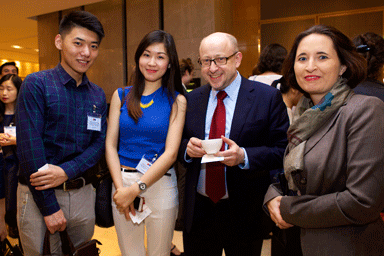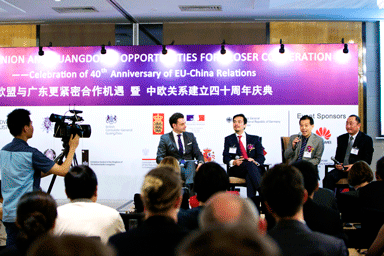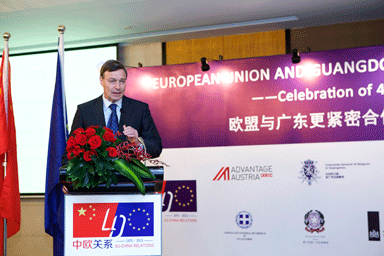40 Years of EU-China Diplomatic Relations
By Anna Rudawska
As part of the celebrations of the 40th anniversary of the establishment of diplomatic relations between the EU and China, the Delegation of the European Union to China and the European Union Chamber of Commerce in China, with the support of Consulate Generals of EU Member States in Guangzhou, organised a business seminar for European and Chinese entrepreneurs on 20th May in Guangzhou. The guest of honour, Hans Dietmar Schweisgut, Ambassador of the European Union to China, was joined by Mr Xu Shaohua, Vice Governor of Guangdong Province and Ambassadors to China and Consul Generals of 23 EU Member States.

Tadeuz Chomicki, Ambassador of the Polish Republic to China (2nd from right) and Joanna Skoczek, Consul General, Consulate General of Poland in Guangzhou (right) with event participants
One of the key points of discussion between Ambassador Schweisgut and local government authorities in Guangzhou was the Guangdong Free Trade Zone (GFTZ). Established on 21st April, 2015, the GFTZ covers an area of 120 square kilometres and comprises parts of Guangzhou’s Nansha New Area, Qianhai-Shekou in Shenzhen and Hengqin in Zhuhai. Mr Ren Xuefeng, Party Secretary, and Mr Chen Jianhua, Mayor of Guangzhou Municipality, stated during a meeting with the EU Ambassador that the recently-established GFTZ is helping to make Guangzhou a more attractive investment destination.
Mr Zheng Jianrong, Director General the GFTZ, clarified the different functions of the separate areas within the GFTZ during the meeting with the Ambassador Schweisgut and elaborated on the government’s aims to further develop ties with Hong Kong and Macau and to establish Guangdong as a hub on the Maritime Silk Road to ensure that the province is at the forefront of reform in China.
Guangdong Governor, Mr Zhu Xiaodan, pointed out to Ambassador Schweisgut during his visit that the EU has remained a key partner to Guangdong during its period of opening up to the rest of the world. The GFTZ presents an opportunity for European companies to continue close cooperation with Guangdong through the piloting of international trading rules, particularly those related to national treatment and the negative list for foreign investments, which would make for easier investment in the region.
Ambassador Schweisgut emphasised that the strong presence of Ambassadors from EU Member States attested to the importance that the EU attaches to Guangdong, and in particular Guangzhou where 11 EU Member States have established Consulate Generals.
This message was echoed by Francine Hadjisotiriou, General Manager of the European Chamber’s South China Chapter. “This unprecedented visit by EU Member States embassies and consulate generals, led by the Ambassador of the European Union to China, is recognition of the importance of the region, the important role that EU companies play here and the importance of the European Chamber as the sole organisation in the region offering support to the EU business community,” she said, adding, “It is our top priority to ensure that this business community is well informed and well connected.”
There is a strong European business presence in the South China region, and the European Chamber’s South China Chapter, established in 2006, with offices in Guangzhou and Shenzhen, work with and support over 300 EU companies active in a diverse range of industries.

From L-R: Alberto Vettoretti, Chairman, South China Chapter, Vivian Desmonts, Vice Chairman, South China Chapter, Yushun Wong, board member, South China Chapter and Fei Luo, Chairman and CEO, Biostime Group
The importance of the South China region to EU business was underlined in June this year with the launch of the first ever European Business in China – South China Position Paper. In this publication the challenges that EU companies face in South China are outlined, including rising labour costs, the bite of the Chinese and global economic slowdown, RMB volatility and increasing competition from Chinese, privately-owned enterprises. The paper reveals that if South China is to remain an attractive destination to foreign investment there needs to be an overall upgrading of its economy.
“South China needs to ensure what we call the ‘three flows’—the flow of people, goods and services, and information—on a larger scale than ever before,” said Alberto Vettoretti, Chairman of the European Chamber’s South China Chapter.
He continued, “If the region is to reinvent itself as a 21st century destination of choice, it needs to attract and retain local and international talent, develop high-tech hubs and invest in the services sector. There is still a lot of work that needs to be done to change the overall image of the region in terms of openness to investment, overall quality of life and the protection of intellectual property, all of which are equally important for fostering a healthy and attractive business and living environment.”
A full copy of the South China Position Paper can be downloaded from the European Chamber’s website: http://www.europeanchamber.com.cn/en/publications-archive/338/South_China_Position_Paper_2015_2016.
Acknowledgements: The European Chamber would like express its sincere appreciation to the EU Consulate Generals present in Guangzhou for being the co-organisers of this event and in particular the Consulate Generals of Italy, Belgium, France, the Federal Republic of Germany, the Kingdom of the Netherlands, Poland and Spain for their support.



Recent Comments